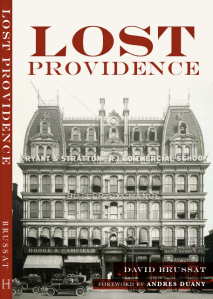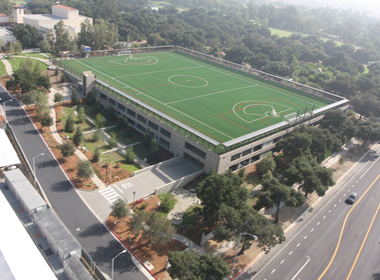
The Shepard Building was until recently the site of URI’s downtown campus and the office of the Rhode Island Department of Education.
Almost nobody has noticed that a perfect match mates two of Rhode Island’s most critical needs. With URI moving out of the Shepard Building, why not move the state archives there instead of erecting a new and inevitably ugly building across Smith Street from the State House for that agency? Such a building was proposed several years ago, but the General Assembly refused to fund it. Thankfully.
My friend Mary Shepard (no relation to the Shepard Co. people) mentioned to me the other day that URI was no longer in the Shepard Building, which it had occupied since the state renovated it to great fanfare in 1996. Mary suggests that the state archives be moved from its current rented location at 33 Broad St. to the Shepard Building, which hosts not just the College of Continuing Education but the office of the Rhode Island Department of Education. Buff Chace, who has worked tirelessly to revitalize downtown since the early 1990s, is also involved in urging that the archives – which is part of the office of the Rhode Island Secretary of State – be moved to the Shepard Building.
A study financed by URI recently concluded that the building’s best use would be as housing. Maybe. But putting the archives there would kill two birds with one stone, avoiding a new building that could mar the view of the State House for all Rhode Islanders, and furnishing an appropriate location for the state archives, which should be located in a historic building downtown and which need not be leased space. The old Shepard’s Co. Store is just such a historic facility.
I was surprised to learn that URI had decided to abandon Shepard’s. Why? So far as I can tell, there is no reason. No doubt a fake reason can be (and probably already has been) fabricated. But the real reason is probably similar to the reason for all of this kind of bureaucratic shuffle. To spend more state money on contractors with friends in the legislature or the state bureaucracy. Architects, staff for the committee charged with deciding what to do next (and there is such an archives committee), copying services for the mounds of paperwork, restaurant tabs for the staff and professionals involved, guards to make sure that the public could not attend meeting scheduled to discuss the “problem,” etc., etc. Well, maybe not that last one, but you never know.
Before URI opened its downtown facility in the Shepard Building, the state thought it might make a nifty location for a Rhode Island history museum. The late Al Klyberg, head of the Rhode Island Historical Society, had gathered a dozen or so entities such as the R.I. Black Heritage Society, each expected to host a small museum of its own inside the facility. When URI moved to Shepard’s, Klyberg tried to set up a museum called Heritage Harbor at the Narragansett Electric plant that eventually came to house the state’s two rival nursing schools, which were never merged into one institution as they ought to have been once they decided to move into one building. It was restored in glorious fashion, but the two nursing schools remain separate organizations there.
How very Rhode Island! The Heritage Harbor idea ended up sucking all the air from local philanthropy here for years, leaving smaller heritage institutions starved for money. They have now benefited from massive covid spending, many of them using the money for dumb purposes, such as the notion of building an ugly new state archives building – a beautiful one would be beyond the pale for most of the “experts” Rhode Island hires to manage such things.
(To view an image of the abomination proposed several years ago for the archives, see my post “Nix on new archives building,” from June 28.)
Rhode Island once stored its archives at the bottom of a pond – I recall hearing of this early in my stay in the state. I think it was somewhere in South County. The British were burning everything officially colonial they could get their hands on during the revolution, and in a pinch the papers of state (a relatively small batch, by that time) were tossed under water in order to protect them from fire, which is more dangerous than water to papers, which can be dried out. Perhaps they were packaged in watertight containers. The papers apparently were retrieved. I have tried to find out more about this incident, but it is shrouded in the mists of time, and even people who might be expected to be aware of it have remained mum.



Hi Dave, When and where did the Providence campus move?
Rosalie Jalbert
http://www.avg.com/email-signature?utm_medium=email&utm_source=link&utm_campaign=sig-email&utm_content=webmail Virus-free.www.avg.com http://www.avg.com/email-signature?utm_medium=email&utm_source=link&utm_campaign=sig-email&utm_content=webmail <#DAB4FAD8-2DD7-40BB-A1B8-4E2AA1F9FDF2>
LikeLike
As of May 3, the latest online (Journal) article on the subject, Rosalie, they don’t seem to have any idea. At least this may mean that there’s no money in the budget to build a new building for the archives.
LikeLike
2005, the subsidies to the 4.4 trillion passenger miles of driving were $17.9 billion, or less than 0.4 cents per passenger mile. By comparison, the subsidies to the 47 billion passenger miles of transit were $29.4 billion, or 62 cents per passenger mile.
How efficient is Transit, vs. Driving?
In 2021, Transit 80 Billion subsidies, but carries barely less than 1% of all passenger travel miles
Road use, 200 Billion, but accounted for 85% of all mileage, and 60% Nations freight/cargo and parcels and bulk commodity goods.
Even if Providence (which I’d support) decided to phase out highways for Boulevards, it’d have no discernible effect on driving, perhaps modest. Parking is actually a Tell tale sign.
Lively downtowns, often have Paid meters and multi-story garages.
Dying downtowns, offer FREE
Here’s a compromise.

Example, Watry design firm, incorporated Soccer field to 2 story parking garage. Double Use.
In Cities you take what you can get in the way of trees and flowers, parks and recreation, and you do that precisely. SO there…..
LikeLike
David, WordPress would not let me post the following comment. If you can arrange to post it, that would be fine with me
Barry
It seems URI-Providence is still in the Shepard Building for now though it has been reported they may move out. I suppose the reason is for easier parking, the same reason many businesses, offices, and even parts of state government (e.g. the Public Utilities Commission) moved out and it may be why the Archives is reluctant to use the building. Yet a recent Golocal story reported 24% of the land area of cntral Providence is for parking, it is never enough!
When you add all the area given over to the major highways and their vast interchanges it is clear the autocentric culture both dominates the city and undermines it. Providence does have good transit access from all directions (including on the commuter rail) but it has inadequate funding, marketing, and promotion. That’s the city’s loss
LikeLike